时间状语从句和原因状语从句专项练习资料
状语从句练习题

状语从句主要用来修饰主句或主句的谓语。
一般可分为九大类,分别表示时间、地点、原因、目的、结果、条件、让步、比较和方式。
尽管种类较多,但由于状语从句与汉语结构和用法相似,所以理解和掌握它并不难。
状语从句的关键是要掌握引导不同状语从句的常用连接词和特殊的连接词即考点。
现分别列举如下:1.时间状语从句23常用引导词:because,since,as,since特殊引导词:seeingthat,nowthat,inthat,consideringthat,giventhat,consideringthat,? MyfriendsdislikemebecauseI’mhandsomeandsuc cessful.Nowthateverybodyhascome,let’sbeginourconference. Thehigherincometaxisharmfulinthatitmaydiscouragepeoplefromtryingtoearnmore. Consideringthatheisnomorethan12yearsold,hisheightof1.80misquiteremarkable.常用引导词:sothat,inorderthat特殊引导词:lest,incase,forfearthat,inthehopethat,forthepurposethat,totheendthat Thebossaskedthesecretarytohurryupwiththeletterssothathecouldsignthem.Theteacherraisedhisvoiceonpurposethatthestudentsinthebackcouldhearmoreclearly.5.结果状语从句67特殊引导词:as(用在让步状语从句中必须要倒装),while(一般用在句首),nomatter…,inspiteofthe factthat,while,whatever,whoever,wherever,whenever,however,whicheverMuchasIrespecthim,Ican’tagreetohisproposal.尽管我很尊敬他,我却不同意他的建议。
初中状语从句总结及练习(附答案)
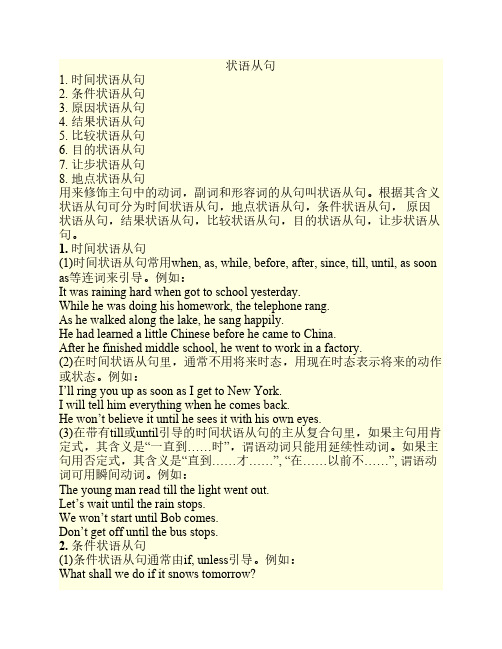
状语从句1. 时间状语从句2. 条件状语从句3. 原因状语从句4. 结果状语从句5. 比较状语从句6. 目的状语从句7. 让步状语从句8. 地点状语从句用来修饰主句中的动词,副词和形容词的从句叫状语从句。
根据其含义状语从句可分为时间状语从句,地点状语从句,条件状语从句,原因状语从句,结果状语从句,比较状语从句,目的状语从句,让步状语从句。
1. 时间状语从句(1)时间状语从句常用when, as, while, before, after, since, till, until, as soon as等连词来引导。
例如:It was raining hard when got to school yesterday.While he was doing his homework, the telephone rang.As he walked along the lake, he sang happily.He had learned a little Chinese before he came to China.After he finished middle school, he went to work in a factory.(2)在时间状语从句里,通常不用将来时态,用现在时态表示将来的动作或状态。
例如:I’ll ring you up as soon as I get to New York.I will tell him everything when he comes back.He won’t believe it until he sees it with his own eyes.(3)在带有till或until引导的时间状语从句的主从复合句里,如果主句用肯定式,其含义是“一直到……时”,谓语动词只能用延续性动词。
如果主句用否定式,其含义是“直到……才……”, “在……以前不……”, 谓语动词可用瞬间动词。
高中时间状语从句及练习(含答案)

状语从句状语从句在句中作状语,修饰主句中的动词、形容词或副词等。
状语从句放在主句之前时,常用逗号分开;放在主句之后,一般不用逗号。
状语从句按其意义和作用可分为时间、原因、地点、条件、让步、目的、结果、方式、比较等9种。
1.时间状语从句时间状语从句表示主句动作发生的时间,主要由when,while,as ; before, after; till (until); once, by the time, as soon as, no sooner ... than和hardly ... when及名词词组the moment等引导。
1) when“在……的时候”; while “在……期间”; as “正当……的时候”when意为“在……的时候”,强调“特定时间”。
When spring came, he felt like a trip.When he was eating his breakfast, he heard the doorbell ring.说明:连词when在状语从句中还有如下几种含义:①表示突然发生的事,含义为“(正在……时)忽然”。
I was just coming along to see you when I ran into Wilson.I had been working a couple of months when I had a letter from Jane.②表示过早发生某事,意为“(还没……)就”。
此含义有时可用before代替。
I hadn’t been reading for half an hour when I heard steps outside.我刚读了不到半个小时就听到外面有脚步声。
I had been there little more than a week when I set to work in earnest.③表示“在……的情况下”,常可译为“虽然”,“既然”,“如果”。
状语从句讲解与练习
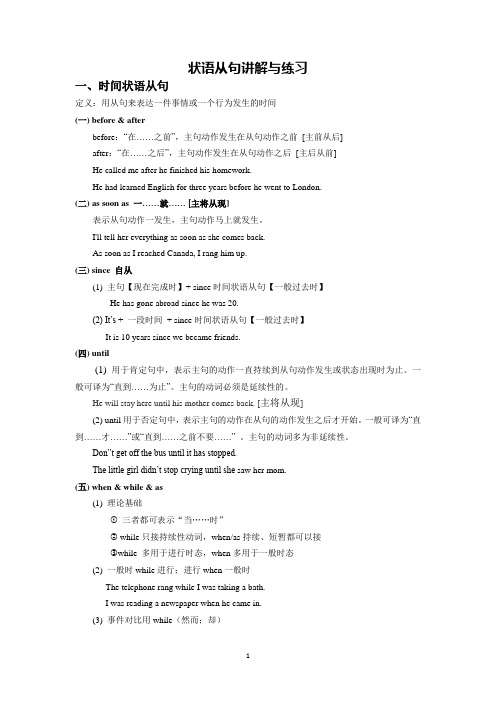
状语从句讲解与练习一、时间状语从句定义:用从句来表达一件事情或一个行为发生的时间(一) before & afterbefore:“在……之前”,主句动作发生在从句动作之前[主前从后]after:“在……之后”,主句动作发生在从句动作之后[主后从前]He called me after he finished his homework.He had learned English for three years before he went to London.(二)as soon as 一……就…… [主将从现]表示从句动作一发生,主句动作马上就发生。
I'll tell her everything as soon as she comes back.As soon as I reached Canada, I rang him up.(三) since 自从(1) 主句【现在完成时】+ since时间状语从句【一般过去时】He has gone abroad since he was 20.(2) It’s + 一段时间+ since时间状语从句【一般过去时】It is 10 years since we became friends.(四) until(1) 用于肯定句中,表示主句的动作一直持续到从句动作发生或状态出现时为止。
一般可译为“直到……为止”。
主句的动词必须是延续性的。
He will stay here until his mother comes back. [主将从现](2) until用于否定句中,表示主句的动作在从句的动作发生之后才开始。
一般可译为“直到……才……”或“直到……之前不要……” 。
主句的动词多为非延续性。
Don”t get off the bus until it has stopped.The little girl didn’t stop crying until she saw her mom.(五) when & while & as(1) 理论基础①三者都可表示“当……时”② while只接持续性动词,when/as持续、短暂都可以接③while 多用于进行时态,when多用于一般时态(2) 一般时while进行;进行when一般时The telephone rang while I was taking a bath.I was reading a newspaper when he came in.(3) 事件对比用while(然而;却)Father was preparing a report while I was playing PC games.He likes coffee while she likes tea.(4) “随着”/“一边…一边”用asThings are getting better and better as time goes on.She sang as she went along.二、原因状语从句because 因为(不与so连用)(1) because &because ofbecause引导原因状语从句because of 是介词短语,后跟n./pron./V-ing,句中作原因状语-- Why didn't he come here?-- He didn’t come here because he was ill.-- He didn’t come here because of his illness.(2) because & for & since & asbecause 语气最强烈;for放句中,用来表示一种附带或补充解释、说明;since & as 通常放句首,作“既然”讲。
状语从句 专项练习(时状、条状) 含答案
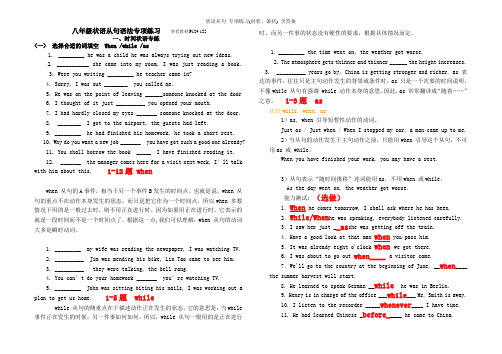
八年级状语从句语法专项练习参看教材P124-125一、时间状语专练<一> 选择合适的词填空 When /while /as1. _________ he was a child he was always trying out new ideas.2. ___________ she came into my room, I was just reading a book.3. Were you writing _________ he teacher came in?4. Sorry, I was out ________ you called me.5. He was on the point of leaving ______someone knocked at the door6. I thought of it just __________ you opened your mouth.7. I had hardly closed my eyes _______ someone knocked at the door.8. ________ I got to the airport, the guests had left.9. _________ he had finished his homework, he took a short rest.10. Why do you want a new job _______ you have got such a good one already?11. You shall borrow the book _____ I have finished reading it.12. _______ the manager comes here for a visit next week, I’ll talk with him about this. 1-12题 whenwhen 从句的A事件,相当于另一个事件B发生的时间点。
【语法专项训练】状语从句翻译专项练习及答案
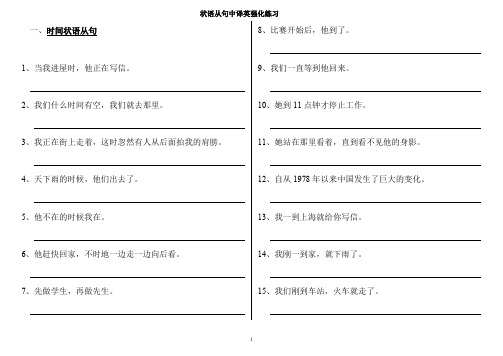
一、时间状语从句1、当我进屋时,他正在写信。
2、我们什么时间有空,我们就去那里。
3、我正在街上走着,这时忽然有人从后面拍我的肩膀。
4、天下雨的时候,他们出去了。
5、他不在的时候我在。
6、他赶快回家,不时地一边走一边向后看。
7、先做学生,再做先生。
8、比赛开始后,他到了。
9、我们一直等到他回来。
10、她到11点钟才停止工作。
11、她站在那里看着,直到看不见他的身影。
12、自从1978年以来中国发生了巨大的变化。
13、我一到上海就给你写信。
14、我刚一到家,就下雨了。
15、我们刚到车站,火车就走了。
16、我们刚开始就被叫停。
17、我每次乘船都晕船。
18、我一听到这首歌,就感到很愉快。
19、下次你来的时候,就会见到他。
二、地点状语从句1、有志者,事竟成。
2、哪里有水,哪里就有生命。
3、你可以随意到你喜欢的任何地方去。
4、无论你去哪都要遵守法律。
三、原因状语从句1、昨天我回来晚了,因为我值班。
2、既然大家都到了,我们开始开会。
3、由于他英语懂得不多,他在字典中查阅这个单词。
4、鉴于天气已经晴朗,我们可以启程了。
5、鉴于他病情严重,我们派人去请医生去了。
四、目的状语从句1、我要把你的电话号码记下来,以免忘记。
2、我把真实情况告诉你,使你能自己作出判断。
3、他们比往常更加努力工作,为了能提前完成工作。
4、多穿点衣服,以免患感冒。
五、结果状语从句1、我们把收音机的音量放大,大家都听到了新闻。
2、他十分激动,以致一句话都说不出来。
3、他说出了这么重要的理由,得到大家的谅解。
4、这是一本十分有意思的书,大家都想看。
六、条件状语从句1、如果我们不怕困难,困难就算不了什么了。
2、除非下雨,我们明天就去那里。
3、只要你努力工作,你就一定能成功。
4、万一我忘了,请提醒我一下。
5、据我所知,那本书下月出版。
七、方式状语从句1、按照我教你的画一只猫。
2、按照人家告诉你做的去做。
3、看上去她好象是生病了。
4、他的行动就好象什么也没有发生。
时间状语从句和原因状语从句专项练习

时间状语从句和原因状语从句专项练习I. Choose the best answer.1. I considered her hard-working and kind _______ I got to know her in the bookstore.A. first timeB. for the first timeC. the first timeD. by the first time2. It was not _______ he took off his dark glasses _______Irealized who he was.A. when; thatB. until; whenC. when; thenD. until; that3. It had been many years _____ Mandela, the former president of South Africa, was set free from prison.A. beforeB. sinceC. untilD. that4. _______ had the bell rung ______ the students took their seats.A. Hardly; whenB. No sooner; whenC. Hardly; thanD. No sooner; then5. We had been walking along the beach for nearly three hours _____ we saw a boat on the sea.A. whenB. beforeC. unlessD. until6. The two brothers quarreled and quarreled _______ they felt sleepy and went to bed.A. whenB. beforeC. unlessD. until7. —What was the party like?—Wonderful. It’s years _______ I enjoyed myself so m uch.A. afterB. beforeC. whenD. since8. It was quite a long time _______ I made out what had happened.A. afterB. beforeC. whenD. since9. _______, he went upstairs to sleep without supper.A. He was tiredB. As he was tiredC. Tired as he wasD. As tired as he was10. We sent the injured to the First-aid Centre_______ the accident happened.A. immediatelyB. hurriedlyC. quicklyD. shortlyII. Fill in the blanks with proper conjunctions.11. She looks unhappy recently _______ her demand has been turned down by her boss.12. _______ times have changed, good revolutionary traditionscan’t be thrown away.13. _______ all the world were against me, I should still hold to my opinion.14. _______ she got the pay, she put it away in the bank.15. I was wandering through the street _______ I caught sight of a tailor’s shop.16. He was drinking juice _______ the rest of us drank whisky.17. _______ you read the poem a second time, the meaning will become clearer to you.18. We walked along the seaside about two hours _______ we came toa fisherman’s village.19. The sailor stayed on the lonely island ____ a ship passed there and rescued him.20. It was eight years_______ the Chinese people drove off the Japanese aggressors.参考答案:1—5 CDAAB 6—10 DDBBA11. because 12. Though / Although 13. (Even) Though 14. As soon as 15. when 16. while 17. When/If 18. before 19. until 20. before英语语法连词状语从句训练专题根据A句完成B句,使两句意思一致,每空只填一词:1. A: Jane is a singer. She is also a dancer.B: Jane is ______ ______ a singer ______ ______ a dancer.2. A: We should learn from books and we should learn from teachers.B: We should learn ______ from books ______ from teachers.3. A: His mother can’t help him with his lessons, and his father can’t, either.B: ______ his mother ______ his father can help him with his lessons.4. A: It’s hard work, but I enjoy it.B: ______ it’s hard work, I enjoy it.5. A: Men can’t live without air and water.B: Men will die without air ______ water.6. A: If you stand higher, you will see farther.B: Stand higher, ______ you will see farther.7. A: If you don’t work harder, you will fail in the exam.B: Work harder, ______ you won’t pass the exam.8. A: How important the meeting is! I can’t miss it.B: It is ______ ____ important meeting ______ I can’t miss it.9. A: After the mother came back, the boy went to bed.B: The boy ______ go to bed ______ his mother came back.10. A: There’re many rabbits there. They can’t kill them all.B: There’re ______ many rabbits there ______ they can’t kill them all.11. A: When I get there, I’ll go to see him at once.B: I’ll go to see him ______ ______ ______ I get there.12. A: You may stay at home. You may also go out with us.(江西B: You may ______ stay at home ______ go out with us.13. A: Mary is the tallest girl in her class.(1999福州)B: Mary is ______ ______ any other girl in her class.14. A: Peter draws well. Henry draws well, too.(1999广西) B: Henry draws ______ ______ ______ Peter.15. A: Mary runs faster than my sister.(1999兰州)B: My sister doesn’t run ______ ______ ______ Mary does. 16. A: Uncle Wang finished his work. He went home.B: Uncle Wang ______ go home ______ he finished his work. 17. A: Lucy has been away from the USA for 5 years.(内蒙古B: It’s 5 years ______ she ______ the USA.18. A: ―Does the girl need any help?‖ he asked me.(甘肃) B: He asked me ______ the girl ______ some help.19. A: Mrs. Smith is my teacher. She is also my good friend.B: Mrs. Smith is ______ ______ my teacher ______ ______ my good friend.20. A: ―Nanjing has changed a lot these years.‖ ―That’s right.‖B: ―Nanjing has changed a lot these years.‖ ―______ it ______.‖二、在下列各句中填入适当的状语从句连词,使句子意思完整、通顺1.________it rains, I go to school by bus. when2. I will tell you the secret _____ you don't tell anyone else about it. (as long as)3. Mary always takes a seat in the first row ______ she can hear better. (where)4. We didn't notice anything wrong with the computer ______we started using it. (until)5. The young doctor was a bit worried ____it was his first time to operate on a patient. (as, because)6. We should study foreign languages ___hard ___Marx did. (as, as)7.The elephant has ___strong a body ___it can do heavy work for people. (so, that)8.It is ___a difficult problem____ nobody can work it out. (such, that)四:各类从句( ) 1. They didn’t start the work ____ their teacher came back.A. untilB. whileC. as soon asD. if( ) 2. The dictionary cost me too much, ____ it’s really useful.A. andB. soC. butD. or( ) 3. –Carl, are you interested in swimming?--Yes, ____ I’m not good at it at all.A. soB. andC. orD. but( ) 4. You’ll be late ____ you don’t get up early tomorrow morning.A. IfB. whenC. beforeD. until( ) 5. I’d like to change this pair of tr ousers, ____ you give me my money back. A. so B. or C. but D. and( ) 6. Alice wanted to know ____ her grandmother liked the bag.A. thatB. ifC. whichD. what( ) 7. Mr John has worked in that small town ____ he left Canada in 1998.A. whenB. afterC. forD. since( ) 8. That was our first lesson, ____ she didn’t know all our names.A. forB. butC. soD. or( ) 9. ____ Saturday ____ Sunday is OK. I’ll be free on these two days.A. Either; orB. Neither; norC. Both; andD. One; the other ( ) 10. He listened to the music ____ he was washing his clothes.A. afterB. beforeC. thatD. while( ) 11. ____ there are too many people here, ____ we have to find another house.A. Because; soB. Though; butC. Since; /D. /; if( ) 12. Can you tell me ____ the nearest hospital is?A. whatB. howC. whetherD. where( ) 13. Don’t drink too much tea in the evening, ____ you won’t fall asleep.A. andB. soC. orD. but( ) 14. ____ he is very young, ____ he knows several languages.A. Though; butB. Because; soC. Though; /D. Because; / ( ) 15. Go down the street ____ you see the third crossing.A. thoughB. sinceC. untilD. while( ) 16. He was ____ tired ____ he couldn’t go on working.A. too; toB. such; thatC. so; thatD. too; that( ) 17. You’d better take this book. It is very good ____ it’s a bit expensive.A. thoughB. andC. butD. so五:综合型1. ____ he is very young, ____ he knows a lot about science.A. Though; butB. Because; soC. Though; /D. When; and2. She was ____ we all like her.A. such a good singerB. such a good singer thatC. a very good singer thatD. so good singer that3. I’ll give her the message ____ she comes back.A. tillB. beforeC. sinceD. as soon as4. Mother didn’t go to bed ____ she finished cleaning the room.A. afterB. untilC. becauseD. while5. It is a long time ____ we met last time in Shanghai.A. beforeB. afterC. sinceD. for6. Can you tell me ____ is she going to give me as a present?A. whereB. whenC. whoD. what7. Rose is an English girl, ____ she doesn’t like English food.A. yetB. soC. forD. and8. Tom laughed ____ the others did, ____ he didn’t understand the story.A. like; thoughB. as; thoug hC. like; becauseD. as; as9. I didn’t hear ____ he sai d just now.A. thatB. whatC. whichD. it10. They were reading ____ the lights were out.A. asB. whenC. whileD. until11. Could you tell me ____ his father is like?A. thatB. howC. whyD. what12. The meeting didn't start___ everyone was there.A. becauseB. untilC. whyD. if13. I won't believe you_____ I have seen it with my own eyes.A. beforeB. untilC. afterD. when14 I'm sure he'll come to see me before he ___ Beijing.A. will leaveB. is leavingC. leaveD. leaves15. By the end of last term, I___ ten books.A. had finished readingB. have finished readingC. had finished to readD. finished read16. I ___ you for a long time. Where ___ you ___?A. didn't see; did; goB. didn't see; have; goneC. haven't seen; have; beenD. haven't seen; have; gone17. _____ he came to study in the university, he has made much progress in the study of English.A. WhileB. WhenC. SinceD. After18. I'd like to go swimming _____ the water is not too cold.A. forB. unlessC. ifD. whether19. Suzhou is not ____ beautiful ____ Hangzhou.A. as; thanB. so; asC. even; thanD. /; than20 Iron is more useful ___ any other metal.A. asB. thanC. thenD. so。
(完整版)初中时间状语从句语法及练习(全)
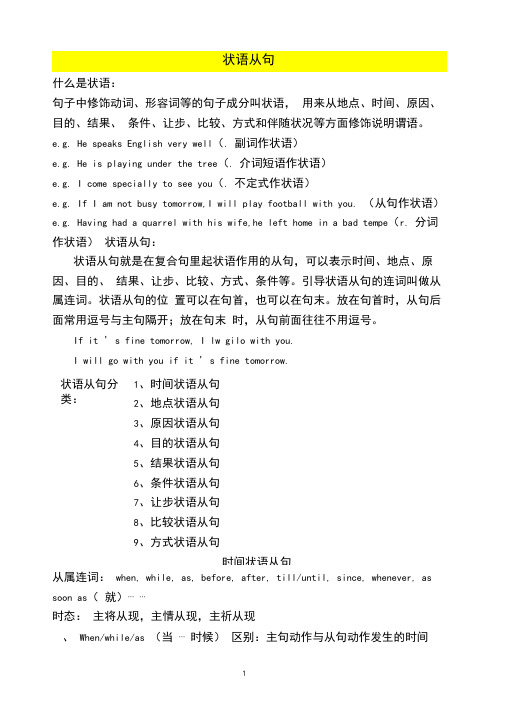
什么是状语:句子中修饰动词、形容词等的句子成分叫状语,用来从地点、时间、原因、目的、结果、条件、让步、比较、方式和伴随状况等方面修饰说明谓语。
e.g. He speaks English very well(. 副词作状语)e.g. He is playing under the tree(. 介词短语作状语)e.g. I come specially to see you(. 不定式作状语)e.g. If I am not busy tomorrow,I will play football with you. (从句作状语)e.g. Having had a quarrel with his wife,he left home in a bad tempe(r. 分词作状语)状语从句:状语从句就是在复合句里起状语作用的从句,可以表示时间、地点、原因、目的、结果、让步、比较、方式、条件等。
引导状语从句的连词叫做从属连词。
状语从句的位置可以在句首,也可以在句末。
放在句首时,从句后面常用逗号与主句隔开;放在句末时,从句前面往往不用逗号。
If it ' s fine tomorrow, I lw gilo with you.I will go with you if it ' s fine tomorrow.状语从句分类:1、时间状语从句2、地点状语从句3、原因状语从句4、目的状语从句5、结果状语从句6、条件状语从句7、让步状语从句8、比较状语从句9、方式状语从句时间状语从句从属连词:when, while, as, before, after, till/until, since, whenever, as soon as(就)⋯⋯时态:主将从现,主情从现,主祈从现、When/while/as (当⋯时候)区别:主句动作与从句动作发生的时间(同时/之前/之后);从句动词(延续性/瞬时性)1)When:when 引导时间状语从句时表示“当⋯⋯的时候”,when既可以指时间段也可指时间点,从句中既可用延续性动词又可用瞬间性动词,且动作既可和主句的动作同时发生又可在主句的动作之前或之后发生。
- 1、下载文档前请自行甄别文档内容的完整性,平台不提供额外的编辑、内容补充、找答案等附加服务。
- 2、"仅部分预览"的文档,不可在线预览部分如存在完整性等问题,可反馈申请退款(可完整预览的文档不适用该条件!)。
- 3、如文档侵犯您的权益,请联系客服反馈,我们会尽快为您处理(人工客服工作时间:9:00-18:30)。
时间状语从句和原因状语从句专项练习
时间状语从句和原因状语
从句专项练习
1. I learnt her hard-working and kind _______ I got to know her in the bookstore.
A. first time
B. for the first time
C. the first time
D. by the first time
2. It was not _______ he took off his dark glass I realized who he was.
A. when; that
B. until; when
C. when; then
D. until; that
3. It was 19 years _______ Mandela, the former president of South Africa, was set free from prison.
A. before
B. since
C. until
D. that
4. _______ had the bell rung _______ the students took their seats.
A. Hardly; when
B. No sooner; when
C. Hardly; than
D. No sooner; then
5. We walked along the beach for nearly three hours _______ we saw a boat on the sea.
A. when
B. before
C. unless
D. until
6. The two brothers quarreled and quarreled _______ they felt sleepy and went to bed.
A. when
B. before
C. unless
D. until
7. —What was the party like?
—Wonderful. It’s years _______ I enjoyed myself so much.
A. after
B. before
C. when
D. since
8. It was quite a long time _______ I made it out what had happened.
A. after
B. before
C. when
D. since
9. _______, he went upstairs to sleep without supper.
A. He was tired
B. As he was tired
C. Tired as was he
D. As tired as he was
10. We sent the injured to the First-aid
Centre_______ the accident happened.
A. immediately
B. hurriedly
C. quickly
D. shortly
1—5 CDAAB 6—10 DDBBA
C1. I learnt her hard-working and kind _______ I got to know her in the bookstore.
A. first time
B. for the first time
C. the first time
D. by the first time
D2. It was not _______ he took off his dark glass I realized who he was.
A. when; that
B. until; when
C. when; then
D. until; that
It was not (until he took off his dark glass) that I realized who he was.
Not (until he took off his dark glass) did I realize who he was.
I didn’t realize who he was (until he took off his dark glass.)
A3. It was 19 years
_______ Mandela, the former president of South
Africa, was set free from prison.
A. before
B. since
C. until
D. that
A4. _______ had the bell rung _______ the students took their seats.
A. Hardly; when
B. No sooner; when
C. Hardly; than
D. No sooner; then
B5. We walked along the beach for nearly three hours _______ we saw a boat on the sea.
A. when
B. before
C. unless
D. until
D6. The two brothers quarreled and quarreled _______ they felt sleepy and went to bed.
A. when
B. before
C. unless
D. until
D7. —What was the party like?
—Wonderful. It’s years _______ I enjoyed myself so much.
A. after
B. before
C. when
D. since
B8. It was quite a long time _______ I made it out what had happened.
A. after
B. before
C. when
D. since
B9. _______, he went upstairs to sleep without supper.
A. He was tired
B. As he was tired
C. Tired as was he
D. As tired as he was
A10. W e sent the injured to the First-aid
Centre_______ the accident happened.
A. immediately
B. hurriedly
C. quickly
D. shortly
1—5 CDAAB 6—10 DDBBA
1.晚餐后,你想去散步
吗?(feel like)
Do you feel like a walk / taking a walk after supper?
2.当他们在演播室拍摄
时,一位女士由于紧张
而昏倒了。
(when)
They were filming in the studio when a lady fainted from nervousness.
3.当他再次踏上舞台时,
观众们为他的精彩演出
而鼓掌。
(when)
When he stepped onto the stage again, the audience
clapped for his wonderful performance.
4.Angela 打败了所有的选
手,赢得了今晚的大
奖。
(beat)
Angela beat all the contestants, and won tonight’s grand prize.
5. 所有的电视观众都很兴奋,因为中国赢得了2008奥运会的主办权。
(because)
All the TV viewers were excited, because China won the right to host the 2008 Olympic Games.。
